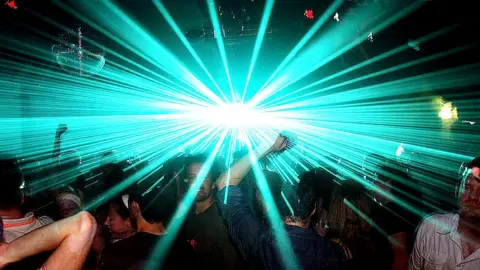Disabled people 'don't feel welcome in nightclubs'
 Alex Kingdom
Alex Kingdom"The amount of people I've seen out in wheelchairs in nightclubs, I could count them - it's under 10."
This is the dispiriting assessment of nightclub accessibility from Cardiff student Alex Kingdom, a wheelchair user who loves to go out to listen to music with his mates.
However, he knows all too well that, for people who use wheelchairs or have other access needs, trying to go for a night out can be a lottery - one which it is all too easy to lose.
A quick browse through a range of websites for Cardiff and Swansea nightclubs makes for sobering reading for anyone hoping to find out whether venues offer help to those with reduced mobility.
Only one club of a random sample had any explanation of its accessibility, which can be essential for disabled customers.
Some which are suitable for wheelchair users do not advertise the fact. For example, Pryzm in Cardiff has lift access to all its levels but does not even mention this on its own website.
This lack of information is something Alex, 21, a University of South Wales media student originally from Exeter, has frequently encountered. He has cerebral palsy and is needs to use his wheelchair full-time when out.
He said: "When I first came to Cardiff, my friends would go 'do you want to go this club' and I'd say I'll have to find out if it's accessible first because there's no indication of that at all."
 Alex Kingdom
Alex KingdomHe enjoys going out, with his favourites being "anything you can sing along to, a bit of cheesy 2000s pop".
"The one I got to the most is probably Live Lounge," he said.
"It's mostly due to how they treat me there. They're very good with people like me and other wheelchair users.
'I don't feel welcome at a club'
"I've been to Pryzm a few times and the staff there are great. The one thing is there's lift access to get to different rooms and the thing I've found is on their website they don't actually tell you if the lift is working or not.
"You have to pay for tickets for Pryzm, so you've paid your entry and you get to the door and it's, 'oh the lift's not working', but there's nothing on the website to indicate that.
"I now have friends in wheelchairs who are 20,19, that [say], 'I don't feel welcome at a club because there's no information for me', they don't know the ways of getting around it.
"Sometimes they'll come to me or other people and ask, but I think there is a fundamental issue there because it also makes it seem like they don't want people in wheelchairs there, or they don't expect it, which shouldn't be the case in the year we're in now."
 Getty Images
Getty ImagesThe Equality Act 2010 says service providers are required to make "reasonable adjustments" to enable users to access their services.
But there is no compulsion for everywhere to be wheelchair accessible, especially in the case of older buildings where adjustments would be difficult or extremely costly.
But even more pressing is the issue of informing people what is available, Alex thinks.
"For someone like me, I can get over it [when there is no access] but for other people it really does get them down and make them feel unwanted.
"The amount of people I've seen out in wheelchairs in nightclubs, I could count them - it's under 10. And I think part of that is just because they don't know that they can go to these things.
"There are so many disabled people that love a drink and all that sort of stuff and would love to do those sorts of things, but don't really feel welcomed by it."
Rekom UK, which owns Pryzm, said it worked hard to make its venues as inclusive as possible and lifts were regularly serviced, but did break down sometimes.
"We try to sure they are repaired as quickly as possible," it said, adding: "We recognise that we need to do more to highlight the facilities we have available, which also include quiet areas for those experiencing sensory overload, and this is something we are working on as part of our guest-first we care strategy."

Michael Kill, chief executive for the Night Time Industries Association (NTIA), is very open about the fact access needs addressing in his sector.
"Without a doubt, the nightclub industry still has a lot of work to do. Some of them are limited by the makeup of their buildings within city centres, listed buildings etc," he said.
"I recognise through our audits of websites and comparative websites for other experiences in different cultural formats and spaces that there is a lot of work to do."
He said the NTIA was working on a training package for members looking at accessibility, particularly "the communication of accessibility".
"There are some very clear and supportive people who want to engage and ensure that people with disabilities have the opportunity to come out and enjoy a night out."
The body is working with Attitude is Everything which has campaigned within the music and live events sector since 2000 to improve access for customers and musicians with disabilities.
The Welsh government said it had set up a disability rights taskforce to look at barriers facing disabled people and had a working group looking at access to services.
A spokesman said: "We recognise the importance of young disabled people having access to a range of social settings."
